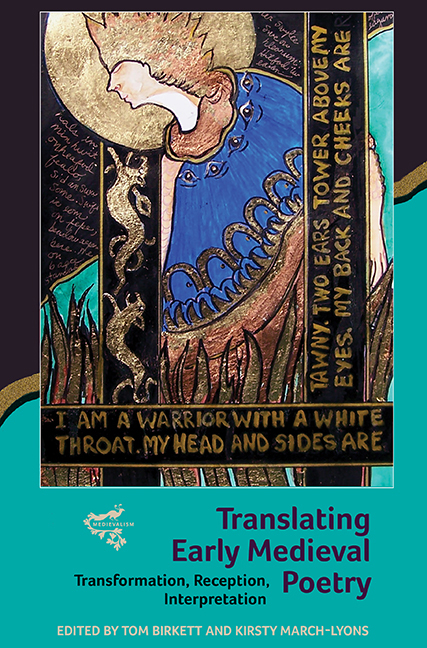Book contents
- Frontmatter
- Contents
- Acknowledgements
- Contributors
- Introduction: From Eald to New
- 1 From Eald Old to New Old: Translating Old English Poetry in(to) the Twenty-first Century
- 2 Edwin Morgan's Translations of Anglo-Saxon Poetry: Turning Eald into New in English and Scots
- 3 Gains and Losses in Translating Old English Poetry into Modern English and Russian
- 4 Borges, Old English Poetry and Translation Studies
- 5 ‘Let Beowulf now be a book from Ireland’: What Would Henryson or Tolkien Say?
- 6 The Forms and Functions of Medieval Irish Poetry and the Limitations of Modern Aesthetics
- 7 Aislinge Meic Conglinne: Challenges for Translator and Audience
- 8 Translating Find and the Phantoms into Modern Irish
- 9 Reawakening Angantýr: English Translations of an Old Norse Poem from the Eighteenth Century to the Twenty-first
- 10 Translating and Retranslating the Poetic Edda
- 11 From Heroic Lay to Victorian Novel: Old Norse Poetry about Brynhildr and Thomas Hardy's The Return of the Native
- 12 Michael Hirst's Vikings and Old Norse Poetry
- Afterword
- A Translation of Riddle 15 from the Exeter Book
- Bibliography
- Index
- Miscellaneous Endmatter
6 - The Forms and Functions of Medieval Irish Poetry and the Limitations of Modern Aesthetics
Published online by Cambridge University Press: 01 September 2018
- Frontmatter
- Contents
- Acknowledgements
- Contributors
- Introduction: From Eald to New
- 1 From Eald Old to New Old: Translating Old English Poetry in(to) the Twenty-first Century
- 2 Edwin Morgan's Translations of Anglo-Saxon Poetry: Turning Eald into New in English and Scots
- 3 Gains and Losses in Translating Old English Poetry into Modern English and Russian
- 4 Borges, Old English Poetry and Translation Studies
- 5 ‘Let Beowulf now be a book from Ireland’: What Would Henryson or Tolkien Say?
- 6 The Forms and Functions of Medieval Irish Poetry and the Limitations of Modern Aesthetics
- 7 Aislinge Meic Conglinne: Challenges for Translator and Audience
- 8 Translating Find and the Phantoms into Modern Irish
- 9 Reawakening Angantýr: English Translations of an Old Norse Poem from the Eighteenth Century to the Twenty-first
- 10 Translating and Retranslating the Poetic Edda
- 11 From Heroic Lay to Victorian Novel: Old Norse Poetry about Brynhildr and Thomas Hardy's The Return of the Native
- 12 Michael Hirst's Vikings and Old Norse Poetry
- Afterword
- A Translation of Riddle 15 from the Exeter Book
- Bibliography
- Index
- Miscellaneous Endmatter
Summary
THE PURPOSE OF this essay is to demonstrate that the corpus of medieval Irish poetry is broader, more challenging, and more imbued with poetic possibility than the relatively narrow range of oft-anthologised, oft-adapted poems would suggest. After an overview of the limited forms of poetry which have tended to be studied, translated and anthologised, and a discussion of some of the key methodological issues, I offer three examples of rather different, and hitherto neglected, poems – religious, historical and didactic – which hint at wider opportunities for creative and poetic engagement with more challenging verse forms. At the end of an essay on linguistics and poetry, the Irish poet Micheal O'Siadhail wrote: ‘I want to hold up the wonder of words and say: How about this?’ My aim here is comparable: I want to hold up some of the lesser-known wonders of medieval Irish poetry and say: How about this? Or this? Or this?
Anthologising Medieval Irish Poetry
When modern poets look to medieval Irish poetry for inspiration, they understandably turn to anthologies of translated medieval verse: Gerard Murphy's Early Irish Lyrics, originally published in 1956, was the first anthology to provide the original texts of a selection of medieval Irish poems, accompanied by facing page translations. It was a landmark publication and, along with two other significant collections, it has determined the way that medieval Irish poetry has been presented to the Anglophone reading public and to modern poets for the last half-century. The academic study of medieval Irish poetry has advanced hugely in the decades since then: large numbers of previously unedited and untranslated poems have been made available, although perhaps not sufficiently available since they can generally only be found in specialist scholarly journals, such as Celtica, Eigse and Eriu. There is no collection aimed at the non-specialist reader which contains these newly-presented riches. And, more frustratingly, in contrast to the corpus of Old English poetry, there are countless medieval Irish poems – beautiful, complex microcosms of medieval thought – which remain unedited and untranslated and thus entirely unavailable to the non-academic reader.
The poems which have previously been selected for inclusion in anthologies have been those which most closely conform to modern expectations of poetry, that is, lyric poetry, narrative verse, occasional verse and nature poetry.
- Type
- Chapter
- Information
- Translating Early Medieval PoetryTransformation, Reception, Interpretation, pp. 92 - 108Publisher: Boydell & BrewerPrint publication year: 2017

